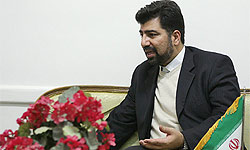
 Iranian Ambassador to Beirut Qazanfar Roknabadi and Secretary-General of Egypt’s Al-Ikhwan al-Muslimun (Muslim Brotherhood) Ibrahim al-Masri in a meeting underlined that the crisis in Syria should be settled through international cooperation and assistance.
Iranian Ambassador to Beirut Qazanfar Roknabadi and Secretary-General of Egypt’s Al-Ikhwan al-Muslimun (Muslim Brotherhood) Ibrahim al-Masri in a meeting underlined that the crisis in Syria should be settled through international cooperation and assistance.
During the meeting in Beirut on Friday, Roknabadi and Masri called for international help for resolving the Syrian crisis through dialogue and diplomatic solution, and reiterated on the need for maintaining Lebanon’s stability and the importance of preventing Syrian crisis affecting Lebanon’s affairs.
Masri praised Iran for its six-point peace plan for resolving the Syrian crisis, and said that both sides (the Syrian government and opposition forces) should be committed to Iran’s plan.
The two sides discussed the regional developments and Iran’s initiative in resolving the Syrian crisis as well as the international efforts, including the measures taken by the UN and Arab League Joint Envoy for Syria Lakhdar Brahimi.
On December 16, the Iranian foreign ministry explained about the contents of its six-point plan for resolving the problems in Syria, saying stop of violence and preventing foreign military intervention stand atop the proposal.
According to the foreign ministry, the first step is stopping violence and preventing military intervention of other countries in the Syrian issue.
The second step is preventing the shipment of weapons and holding national talks. Setting up a committee of the representatives of the Syrian people and government to reach an agreement on necessary reforms, taking steps to hold elections, reforming the Constitution as well as holding parliamentary and presidential elections are among the other moves demanded by the Iranian proposal.
The Islamic Republic of Iran, which is a staunch supporter of the establishment of security and stability in Syria, has practically made a series of moves in the same regard, including its recent call for ceasefire which was staged in Syria in October, and the holding of the Syrian National Dialogue conference in Tehran between the Syrian opposition and government in November.
Over 200 Syrian religious and political figures, leaders of tribes and parties as well as representatives and leaders of the opposition groups joined the two-day meeting in Tehran which kicked off on Sunday.
A number of Syrian parliament members as well as senior political figures from Sudan, Algeria, Turkey, Egypt, Lebanon, Iraq, Brazil and Zimbabwe also took part in the meeting.
Syria has been experiencing unrest since March 2011 with organized attacks by well-armed gangs against Syrian police forces and border guards being reported across the country.
The US and its western and regional allies have long sought to topple Assad and his ruling system. Media reports said that the Syrian rebels and terrorist groups have received significantly more and better weapons in recent weeks, a crime paid for by the Persian Gulf Arab states and coordinated by the United States.
The US daily, Washington Post, reported in May that the Syrian rebels and terrorist groups battling the President Bashar al-Assad’s government have received significantly more and better weapons in recent weeks, a crime paid for by the Persian Gulf Arab states and coordinated by the United States.
The newspaper, quoting opposition activists and US and foreign officials, reported that Obama administration officials emphasized the administration has expanded contacts with opposition military forces to provide the Persian Gulf nations with assessments of rebel credibility and command-and-control infrastructure.
Opposition activists who several months ago said the rebels were running out of ammunition said in May that the flow of weapons – most bought on the black market in neighboring countries or from elements of the Syrian military in the past – has significantly increased after a decision by Saudi Arabia, Qatar and other Persian Gulf states to provide millions of dollars in funding each month.







